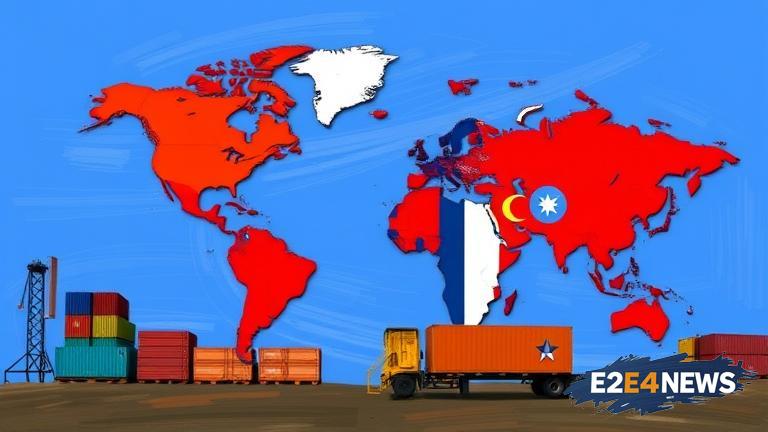The Trump administration’s decision to impose tariffs on several countries, including China, Canada, and Mexico, has sent shockwaves throughout the global economy. The tariffs, which range from 10% to 25% on various goods, have been implemented in an effort to protect American industries and jobs. However, the move has been met with widespread criticism and retaliation from affected countries. China, for example, has imposed its own tariffs on American goods, including soybeans and pork. The escalating trade tensions have caused economic uncertainty, with many businesses and investors expressing concern about the potential impact on global trade. The tariffs have also sparked fears of a trade war, which could have far-reaching consequences for the global economy. The Trump administration has argued that the tariffs are necessary to protect American industries and jobs, but critics argue that they will ultimately harm consumers and businesses. The tariffs have already started to take effect, with many companies reporting increased costs and reduced profits. The impact of the tariffs is being felt across various industries, including agriculture, manufacturing, and technology. Farmers in the United States, for example, are facing significant losses due to the tariffs on soybeans and other agricultural products. The tariffs have also caused a decline in the value of the Chinese yuan, making it more expensive for American companies to import goods from China. The European Union has also been affected by the tariffs, with many European companies facing increased costs and reduced profits. The trade tensions have also sparked concerns about the potential impact on the global economy, with many economists warning of a potential recession. The International Monetary Fund (IMF) has also expressed concern about the trade tensions, warning that they could have a significant impact on global economic growth. The World Trade Organization (WTO) has also been critical of the tariffs, arguing that they violate international trade rules. The Trump administration has defended its actions, arguing that the tariffs are necessary to protect American industries and jobs. However, the move has been widely criticized by many countries, including Canada, Mexico, and China. The tariffs have also sparked a heated debate about the role of trade in the global economy, with many arguing that free trade is essential for economic growth and development. Despite the criticism, the Trump administration has shown no signs of backing down, with many officials arguing that the tariffs are a necessary step to protect American interests. The impact of the tariffs will be closely watched in the coming months, with many economists and investors warning of a potential downturn in the global economy. As the trade tensions continue to escalate, many businesses and consumers are bracing themselves for the potential impact of the tariffs. The situation remains fluid, with many countries and companies waiting to see how the situation will unfold. The Trump administration’s tariffs have sparked a global trade war, causing economic uncertainty and potential losses for businesses and consumers alike. The situation is being closely watched by many countries and companies, with many warning of a potential downturn in the global economy. The tariffs have already started to take effect, with many companies reporting increased costs and reduced profits. The impact of the tariffs will be felt across various industries, including agriculture, manufacturing, and technology. The trade tensions have also sparked concerns about the potential impact on the global economy, with many economists warning of a potential recession.
